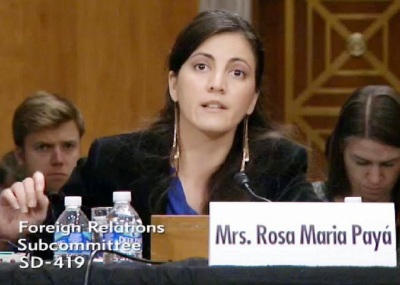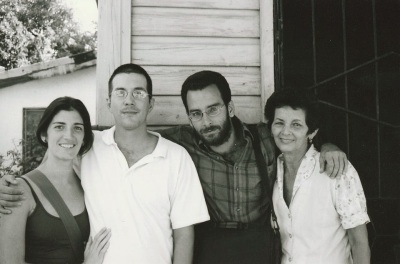In recent years my country has been engaged in a deception. The Cuban government is changing the Law, but ignoring the rights of the people, which were sequestered over half a century ago.
More people are allowed to enter and leave the country, but the regime decides who can enjoy this “privilege”. The migratory reform was established as a control mechanism. For example, the government has invalidated the passport of the artist Tania Bruguera for attempting a performance in Havana. Sonia Garro, a member of the Ladies in White, and one of the political prisoners released during the Washington-Havana secret deal, cannot travel abroad and thus she is still a hostage of the government, as Alan Gross was for 5 years. The same applies to the former prisoners of the Cause of the 75 from the spring of 2003.
The Cuban government has permitted more people to operate small businesses, but due to the Cuban laws, entrepreneurs cannot be a factor to foster democracy because their existence as “private” owners depends on their submission to the government. There cannot be free markets where there are no free persons.
The Cuban government said it would free 53 political prisoners, but instead it released them on parole. Meanwhile, many others were not freed at all. Yosvani Melchor was transferred to a maximum security prison last December. He was put in prison 4 years ago for being the son of a member of the Christian Liberation Movement, who refused to cooperate with State Security. The young artist Danilo Maldonado, known as El Sexto, was imprisoned after December 17 without committing any crime. The regime turns political prisoners into pieces to be exchanged, because they can catch-and-release at will more political prisoners, and democratic nations accept this blackmail with innocent citizens.
As my father did, four months before he was killed, I denounce the regime’s attempt to impose a fraudulent change, and I denounce the interests that hamper a real transition and the recovery of our sovereignty. My father also denounced the attempt to link groups of exiles to this fraudulent change. He said, “The diaspora is the diaspora because they are Cuban exiles to whom the regime denied all rights, as they do to all Cubans. In such a context of oppression, without rights and without transparency, the insertion of the diaspora would only be part of the fraudulent changes.” As the engagement would be fraudulent, if the United States were to accept the rule of the Cuban government. We have never asked our people to be isolated or embargoed, but engagement will only be real if it occurs between free peoples.
We urge you to truly open up to Cuba, but to advance a helping hand is essential the solidarity with the Cuban citizenry. It is essential to support the peaceful and legal changes that thousands of Cubans have presented to their fellow citizens and to the Cuban Parliament, an alternative that allows our people to decide their own future.
There is no respect for the self-determination of the Cuban people when negotiations are a secret pact between elites, or when there is no mention that the Cubans can participate or be represented in their own society.
I know that the US Congress and the Administration will do what you think is best for this country, which has served as refuge for nearly 20% of our population. But only a real transition to democracy in Cuba can guarantee stability for the hemisphere. We the Cubans are not Chinese, we are not Vietnamese, and we definitely won’t accept a Putin-like model towards despotism.
The strategy to prevent a mass exodus from Cuba is not by saving the interests of the group now in control, this is an unstable equilibrium that could end in more social chaos and violence. In fact, this country is already facing a Cuban migratory crisis, despite the record numbers of US visas granted. More than 6,500 Cubans arrived in the United States via the Mexican border since last October, and more than 17,000 did so in the previous year. With or without the Cuban Adjustment Act, this situation will get worse because of the attempts of those in power in Cuba for self-preservation of the status quo.
We Cubans want real changes, to design the prosperous country that we deserve and can build. The only violence here comes from the Cuban military against Cubans, that’s why the solution is a peaceful transition, not an appeasement.
The way that you can promote stability in the region is through supporting strategies that engage the popular will, to reach the end of totalitarianism with dignity for everyone. You have the opportunity to support the petition for a constitutional plebiscite in favor of multi-party and free elections, already signed by thousands of citizens in the Varela Project, as is allowed for the Cuban constitution. There is an active campaign by Cubans from all over the globe, asking for rights for all Cubans and the Plebiscite, which is a first vote for the long-lasting changes that Cuba needs.
On 22 July 2012, Cuban State Security detained the car in which my father, Oswaldo Payá, and my friend Harold Cepero, along with two young European politicians, were traveling. All of them survived, but my father disappeared for hours only to reappear dead, in the hospital in which Harold would die without medical attention.
The Cuban government wouldn’t have dared to carry out its death threats against my father if the US government and the democratic world had been showing solidarity. If you turn your face, impunity rages. While you slept, the regime was conceiving their cleansing of the pro-democracy leaders to come. While you sleep, a second generation of dictators is planning with impunity their next crimes.
That is why we hope that this Congress demands that the petition for an independent investigation, regarding the attack against Oswaldo Paya and Harold Cepero, be included in the negotiations with the Cuban government, and that we hear publicly what response is given to this point. Knowing the whole truth is essential in any transition process, and to tolerate impunity is to endanger the lives of all Cubans wherever we live.
Don’t turn your backs on Cubans again; don’t earn the distrust of the new actors of our inevitably free future, in exchange for complicity with a gerontocracy who belongs to the Cold War era.
I want to conclude with the words my father wrote to President Obama 5 years ago:
“Your government must move forward and extend a hand to the people and government of Cuba, but with the request that the hands of Cuban citizens not be tied. Otherwise, the opening will only be for the Cuban government, and will be another episode of an international spectacle full of hypocrisy. A spectacle that reinforces oppression, and plunges the Cuban people deeper into the lie and total defenselessness, seriously damaging the desire of Cubans for the inevitable changes to be achieved peacefully. The pursuit of friendship between the United States of America and Cuba is inseparable from the pursuit of liberty. We want to be free and be friends.”
God bless and protect our peoples.
Thank you.
Rosa María Payá Acevedo
3 February 2015





